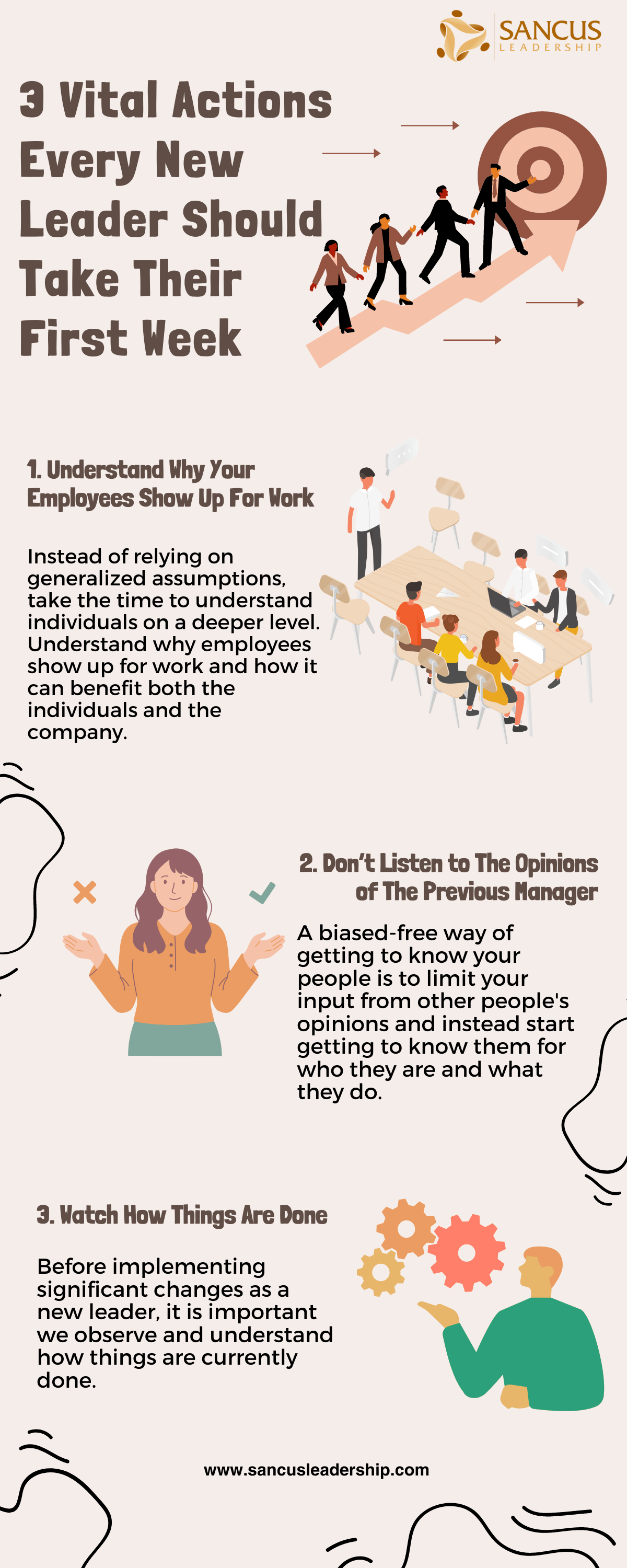To understand why some managers fail and some succeed, we (Sancus Leadership) designed a study asking leaders and employees what they think new leaders and managers should focus on during the first 90 days of their job. We interviewed highly experienced small team leaders from various industries, including the Air Force, product managers, and software developers. This article breaks that down into details about the first week.
Your first week as a new leader must focus on your employees’ intrinsic motivation, staying bias-free, and observing how the company operates. Experts say time spent on logistics is wasted, and implementing change is too soon and will most likely fail.
Since getting to know your people is the highest priority during the first week, here are three things every leader should do in the first week to build strong relationships and set themselves up for a successful career as a manager while avoiding the most significant pitfalls. So stick around!
1. Understand Why Your Employees Show Up For Work

One of the biggest mistakes I see with new leaders is that they don’t seek to understand why people show up for work. Many managers think it’s because of the money or the benefits.
One of the biggest mistakes I see with new leaders is that they don’t seek to understand why people show up for work.
This is rarely true, and it would only explain why people show up for “a job,” not “this particular job.”
I have had the best success with my teams when I truly understand why people put up with the suffering, the long hours, and the low pay that comes with working on an Explosive Ordinance Disposal (EOD) team in the army.
Managers who don’t do this instead try creating incentives and motivating their personnel by generalized assumptions about what drives their people. This will be less effective than knowing precisely what motivates your team.
For example, when I understood that Fredrick (one of my teammates) was driven by personal relationships instead of physical challenges, I put him in a position where he would interact with new people, such as teaching or instructing.
I understood his inner drive and used that knowledge to benefit the company and himself. He was happier, more fulfilled, and delivered greater output.
2. Don’t Listen to The Opinions of The Previous Manager

I often work with a new team and discuss with the old team leaders. Before long, they tell me this person is this way, and another person is different. When that happens, I tell them politely but firmly that I am not interested in hearing that right now, but I would like to listen to their thoughts about each employee once I’ve had time to build my own experience.
When you start gathering opinions about people from a third-party source, rather than watching them and interacting with them, you run the risk of a few things, including the following:
- You might adopt someone else’s perspective that you disagree with. Then you will fall prey to confirmation bias and start seeing that behavior more often than it exists.
- You deny the ability of your employees to give you the first impression of someone they want to be. Maybe they have a beef with the old manager and now want to be a better version of themselves. If you let your judgment get tinted by the previous manager, you might not be able to recognize that this person is trying to change.
A biased-free way of getting to know your people is to limit your input from other people’s opinions and instead start getting to know them for who they are and what they do. Remember, we are what we do, not what we say we do, or what other people say.
Remember, we are what we do, not what we say we do, or what other people say.
3. Watch How Things Are Done

According to our study, the biggest mistake a new leader can make is to implement significant changes immediately. This is like pulling the rug underneath their feet and removing their stability. Employees then question whether or not they are a good fit for this job.
We, as humans, are all inclined to enjoy the status quo, even if it’s not perfect. The old saying, “the devil we know,” means we would rather deal with bad things than recognize that something potentially better but unknown perfectly encapsulates this.
Before we push changes, we must first comprehend how things are already done.
Understanding the situation, the task, the resources, and the mission is vital before making risky decisions that will impact our people and how they perceive us as leaders.
Understanding the situation, the task, the resources, and the mission is vital before making risky decisions that will impact our people and how they perceive us as leaders.
If we comprehend the situation, we will implement changes based on faulty assumptions and an incomplete view of the organization. This could have better outcomes, further hindering your chances of becoming a successful manager.
When I start working with a new team, here are things that I closely watch before making any significant changes:
- When are meeting participants encouraged to talk, and when not? Is there someone that leads the meeting informally?
- Who are the informal leaders of the organization? Is there anyone that, when they talk, people listen extra carefully?
- What language is used? Are they speaking with a particular jargon?
| What to do before making significant changes | Description |
| When are meeting participants encouraged to talk, and when not? Is there someone that leads the meeting informally? | The dynamics of meetings can vary depending on the purpose, structure, and participants involved. However, there are generally a few guidelines regarding when meeting participants are encouraged to talk and when they should refrain from doing so. |
| Who are the informal leaders of the organization? Is there anyone that, when they talk, people listen extra carefully? | The informal leaders in an organization can vary depending on the context and dynamics within the specific organization. These leaders often emerge based on their expertise, experience, interpersonal skills, and the respect they command from their peers. |
| What language is used? Are they speaking with a particular jargon? | The language used within an organization can vary depending on the industry, organizational culture, and the specific context of communication. While there may be some jargon or specialized terminology used within certain departments or professions, the overall language used in organizations tends to be a blend of formal and informal communication styles. |
If you would like to work with me, please schedule a free call at your earliest convenience.

Here are 7 things that you should focus on as a new manager to get off on the right foot and make your first week run as smoothly as possible.
Conclusion
To be successful as a new leader in the first week, it’s vital to start understanding your colleagues and what makes them tick so you can use that drive to assign them tasks they will excel at. As we get to know our new team members, we should stay as bias-free as possible and allow people to be a better version of themselves instead of listening to the former manager.
Finally, to make significant decisions, we must first understand how the organization operates so that our first significant changes have a high chance of success!



